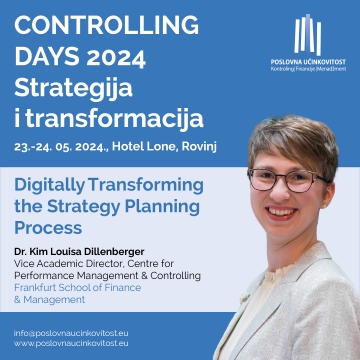Interview on the digital transformation of the planning process

Dr. Kim Louisa Dillenberger, Vice Academic Director, Centre for Performance Management & Controlling at Frankfurt School of Finance & Management, presented the digital transformation of the planning process in a short interview, and this topic will be discussed in more details at:
CONTROLLING DAYS 2024, 23.-24.05.2024.
How do you assess the need to digitalize the planning process?
In many controlling departments, the planning process consumes unnecessarily high amount of resources – both in terms of time, effort and FTE. It is tedious work, which gets obsolete quickly in the volatile times we operate in now. Despite that, a problem that concerns me is that many controllers consider the planning process – in its current form – as useless and pointless. That´s an alarming development, which has to be reversed. Digitalization is key to fundamentally change the planning process. Digital tools enable flexible planning that fits to our times – and the need to adjust to these times has never been bigger. It is the only way to thrive in this dynamic environment.
What is the current state of the digitalization of the planning process?
I observe a large gap between the vision of a flexible planning process and the actual status quo of planning in traditional manner. Especially the Covid-19 crisis boosted the awareness for the required renewal of the planning process. Yet, despite the increased awareness and even clear visions, many companies fail to truly digitalize. The challenge is to act upon these visions and fundamentally change the planning process „on the go“. To date, a myriad of companies have not realized the (full) potential that digital technologies offer for renewing the planning process.
What turns digitalizing the planning process into such a big challenge?
A key problem with digitalizing the planning process, is the ambidexterity inherent to the process. Ambitexterity generally describes a company´s ability to efficiently exploit the existent (exploitation) and flexibly explore the new (exploration) at the same time. The planning process even underlies multiple ambidexterities. For example, a planning process must be executed precisely, at the same time it has to be up to date. It must be detailed for one stakeholder, but high-level for the other. It should be a stable process, but also adaptive in nature. Digitalizing the planning process, these ambidexterities have to be solved which is – despite the digitalization – already a big challenge. I therefore call for not only implementing digital tools, but foremost transforming the process itself.
What helps to successfully transform the planning process?
Based on a benchmarking-study on the digitalizal transformation in controlling, we derived a model of multiple planning ambidexterity. It summarizes the challenging dimensions underlying the planning process, as described earlier. The idea is to turn the challenge into a tool for change. How? Before discussing what digital tools to implement, it makes sense to review the planning process itself. The model can be used as a tool for analysis in order to discuss the status quo, identify major pain points and position on the continuum of ambidexterity, for instance you will clarify on how adaptive vs. stable the current planning process is. In a next step, the model can be used for goal formation by deciding for the future positioning on the continuum of ambidexterity. Only then comes the question of which digital tools will fit that positioning best. That way the digitalization is more comprehensive and as tailored which increases the changes for a successful tranfsormation.
What´s the role of CFOs in the digital transformation of the planning process?
CFOs face the challenge of driving and regulating the change at the same time. Meaning, they have to be a pioneer, but also a perserver. It is important to create new visions, communicate and motivate for renewal, but it is just as important to be critical, listen and defend proven practices. Especially when it comes to planning, some core parts and characteristics of the process have to remain for it to make sense. With all the unquestioned need for change, it is important to identify what exactly needs to be changed (and what not). I see this critical task as one of the key tasks of CFOs in the digital transformation of the planning process.
You can learn more about the topic of digital transformation of the planning process at:

